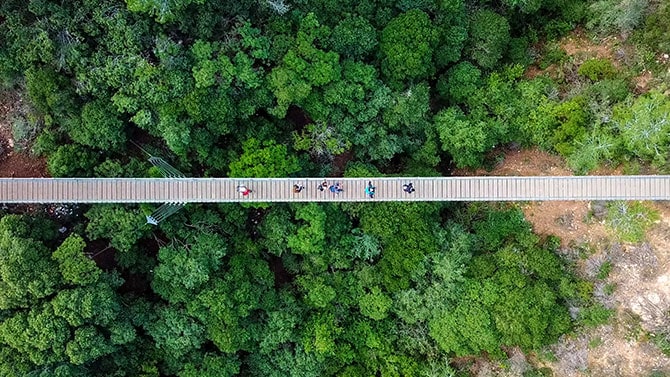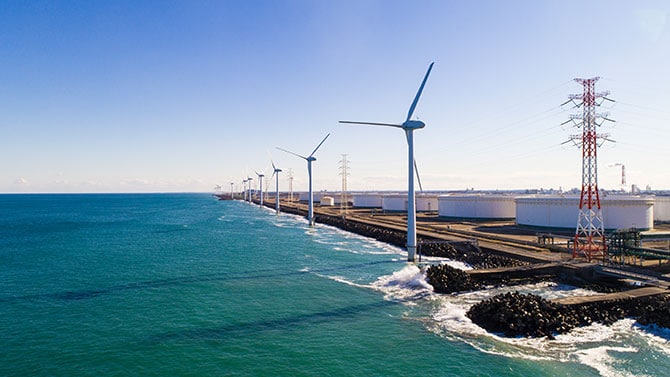{{item.title}}
{{item.text}}

{{item.title}}
{{item.text}}
‘Climate change is real, so is our power to change it.’
In the latest Climate Change Performance Index (CCPI) report released at the UN Climate Summit COP28 in Dubai recently, India ranked seventh out of 180 countries, up one spot from the previous CCPI, and remained among the highest performers. The country also received a high ranking in the greenhouse gas (GHG) Emissions and Energy Use categories, but a medium ranking in Climate Policy and Renewable Energy.1
Neither geography nor an individual is immune to climate change. The earth and all its inhabitants – rich and poor, young and old – are under a shadow. In India, climate change due to rising temperatures and changing patterns of monsoon rainfall could cost the economy 2.8% of its gross domestic product (GDP) by 2050, as per a World Bank report.2 Rising temperatures, extreme weather events, sea-level rise, changing precipitation patterns are pressing concerns which indicate that there is considerable ground yet to be covered when it comes to climate change adaptation in India. PwC's 27th Annual Global CEO Survey: India perspective underscores the point. Climate change is an important megatrend that is pressuring CEOs to reinvent themselves. The labour hours lost due to extreme heat and humidity could cost India up to 4.5% of its GDP by 2030, suggests a Reserve Bank of India report.3
This edition of Immersive Outlook, Moving the needle on climate change adaptation, highlights this theme of climate change adaptation, looks at the gaps which need to be addressed and provides recommendations to bridge them. It also examines nature-based solutions which could accelerate climate action, and deep dives into technologies that are shaping climate change adaptation and could benefit businesses in the long term.
The edition also includes transcripts of insightful video interviews with subject matter experts in this field – Deeksha Vats, the Chief Sustainability Officer at Aditya Birla Group, and Subramanian Sarma, Whole-time Director and Senior Executive Vice President (Energy) at Larsen & Toubro (L&T).
The perspectives they bring to the table hold out hope and learnings that can be imbibed to enhance resilience and prepare for a greener and cleaner tomorrow.
We hope you find the articles informative and relevant. Please reach out to us if you would like to have a more detailed discussion on any of the aspects we have touched upon.
Vishnupriya Sengupta, Senior Director – Markets
Varun Dua, Founder and CEO, Acko General Insurance Limited, believes insurance companies need to transition from being complex product companies to trust and brand companies. In an online interview with Joydeep K Roy, Partner and India Financial Services Advisory Leader and Global Health Insurance Leader, he outlines the key factors that could ensure wider reach and lead to enhanced customer experience.
A collaborative approach among stakeholders to mitigate and adapt to climate risks is an absolute necessity, emphasises Deeksha Vats, Chief Sustainability Officer, Aditya Birla Group (ABG), in an online interview with Madhura Mitra, Executive Director, Climate Change and Carbon Markets.
A three-pronged approach – which includes reducing consumption, encouraging use of alternative fuels, and proactively preparing for the future – can drive climate change adaptation and resilience efforts in the country, says Subramanian Sarma, Whole-time Director and Senior Executive Vice President (Energy) at Larsen & Toubro (L&T) in a conversation with PwC India’s ESG Leader Sambitosh Mohapatra.
Effective action on climate adaptation will require multiple stakeholders to collaborate and pool their strengths and capabilities. Madhura Mitra and Peer M. Muna outline why public-private partnerships are crucial for adaptation action and the imperative for businesses to incorporate climate adaptation into their boardroom agenda.
With the effects of climate change becoming more pronounced, adaptation will be as important as mitigation, and that requires investments into climate technologies. Deepak Mahurkar and Shardul Fadnavis look at six technologies that could offer businesses the opportunity to innovate for climate adaptation and lock in long-term benefits.
As technology advances, the human connection becomes even more important, says Shyam Srinivasan, MD and CEO, Federal Bank. In conversation with Venkata Peri, Partner and Research and Insights Hub Leader at PwC India, Srinivasan throws light on the changing nature of banking.
Lorem Ipsum is simply dummy text of the printing and typesetting industry. Lorem Ipsum has been the industry's standard dummy text ever since the 1500s, when an unknown printer took a galley of type and scrambled it to make a type specimen book.
Lorem Ipsum is simply dummy text of the printing and typesetting industry. Lorem Ipsum has been the industry's standard dummy text ever since the 1500s, when an unknown printer took a galley of type and scrambled it to make a type specimen book.




